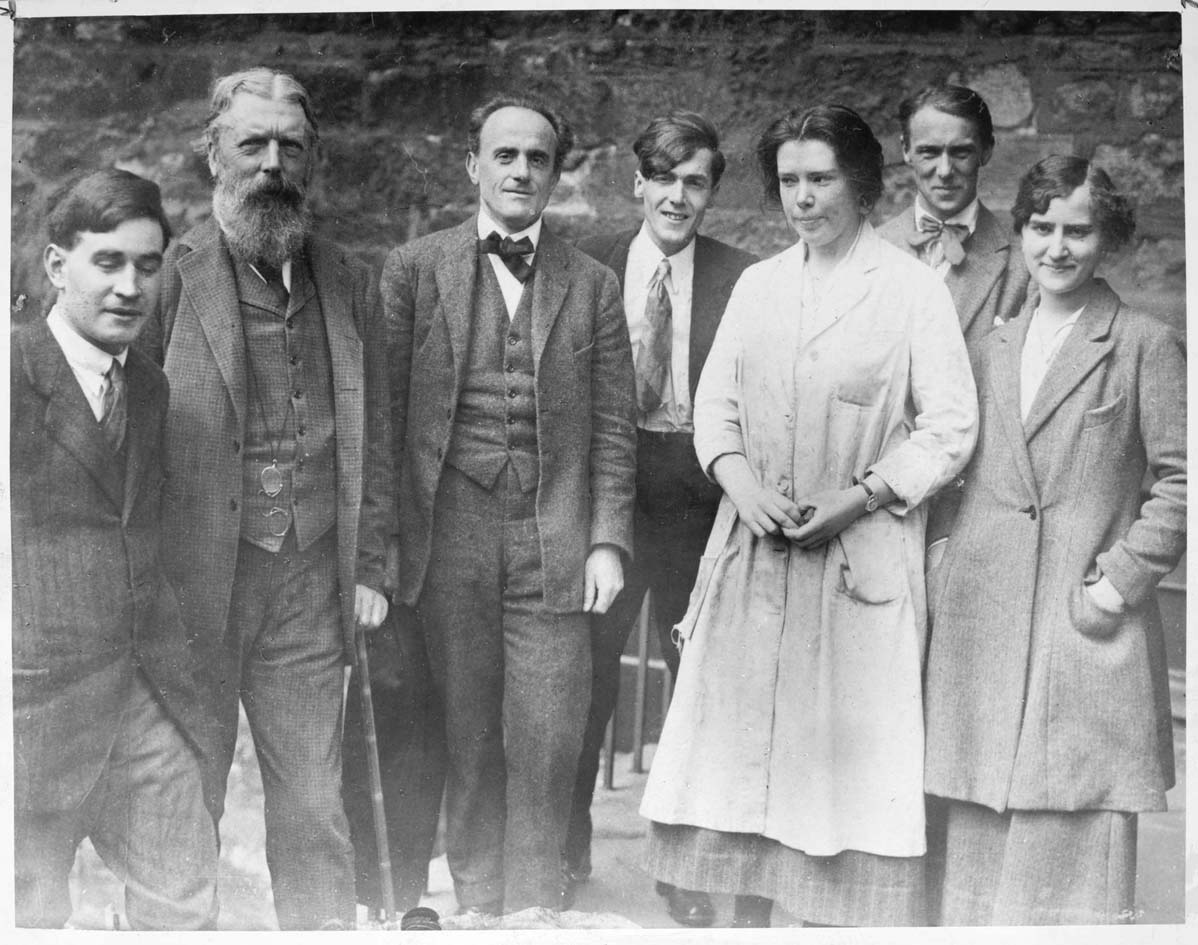 Tomorrow (2nd March) marks the birthday of Professor F.A.E Crew (1886-1973), who was the first Director of what became known as the Institute of Animal Genetics in Edinburgh from 1921 until 1944. It would be a long blog post indeed to try and do justice to this remarkable man. Crew, medically qualified but with a lifelong interest in breeding fowl, steered the Institute from its penniless early days into its heyday as a world renowned research centre, attracting such individuals as Nobel winner H.J Muller. The image above shows Crew (second from the right in the natty cravat) with a group of similarly renowned visitors to the Institute including Dame Honor Fell (Director of Strangeways Laboratory, Cambridge) and zoologist/medical statistician Lancelot Hogben. However, Crew’s influence was by no means confined to the sphere of genetics. He fought in both world wars, attaining the rank of Major in the First War, then Brigadier in the Second. By the time the Second War was at a close, Crew gave up the Directorship of the Institute in order to take up the Chair of Public Health and Social Medicine at Edinburgh University. He also established the Polish School of Medicine in Edinburgh (which awarded medical degrees recognised by the Polish government in exile until its closure in 1949), wrote the impressive six-volume official Army Medical History of the War, was World Health Organisation Visiting professor at Rangoon and Bombay (he also set up the first medical genetics clinic in India) and was happily driving around Turkey in a caravan well into his seventies.
Tomorrow (2nd March) marks the birthday of Professor F.A.E Crew (1886-1973), who was the first Director of what became known as the Institute of Animal Genetics in Edinburgh from 1921 until 1944. It would be a long blog post indeed to try and do justice to this remarkable man. Crew, medically qualified but with a lifelong interest in breeding fowl, steered the Institute from its penniless early days into its heyday as a world renowned research centre, attracting such individuals as Nobel winner H.J Muller. The image above shows Crew (second from the right in the natty cravat) with a group of similarly renowned visitors to the Institute including Dame Honor Fell (Director of Strangeways Laboratory, Cambridge) and zoologist/medical statistician Lancelot Hogben. However, Crew’s influence was by no means confined to the sphere of genetics. He fought in both world wars, attaining the rank of Major in the First War, then Brigadier in the Second. By the time the Second War was at a close, Crew gave up the Directorship of the Institute in order to take up the Chair of Public Health and Social Medicine at Edinburgh University. He also established the Polish School of Medicine in Edinburgh (which awarded medical degrees recognised by the Polish government in exile until its closure in 1949), wrote the impressive six-volume official Army Medical History of the War, was World Health Organisation Visiting professor at Rangoon and Bombay (he also set up the first medical genetics clinic in India) and was happily driving around Turkey in a caravan well into his seventies.
Charismatic, handsome, a beautiful writer and renowned as a public speaker (his friend Hogben remarked that ‘he had a histrionic talent worthy of a Shakespearean actor’) Crew nevertheless remained self effacing all his life, always claiming that his career moves were down to ‘pure luck’ and that ‘mine has not been a very distinguished career’. Crew left no traceable personal archive, but treasures such as a photocopied draft of an autobiography and an endlessly colourful 8 hour interview recording with Margaret Deacon of the Science Studies Unit helps to fill out the picture. The latter recording captures Crew’s wry humour, compassion and humility perfectly whilst also providing such memorable anecdotes as his keeping of tame goats in his office at the Institute (whose constant grazing apparently saved him from having to be bothered by any official correspondence) and the experimental cocks which Crew trained to walk down to the cellar each night so as not to disturb the neighbours!
He remained eloquent and witty right up until his death aged 87. As he was also a committed humanist, his conclusion to his essay ‘On the Meaning of Death’ published in A.J Ayers’ The Humanist Outlook (1968), is a fitting epithet: ‘In a world so organized that everyone equipped to do so would be able to enjoy life at least as much as I have done, there would be very few who would hanker after an existence beyond the grave for the life lived on this earth would be complete in itself.’

It’s my birthday too! 2 March. John
Obviously all the best people share that date… Happy birthday for tomorrow!